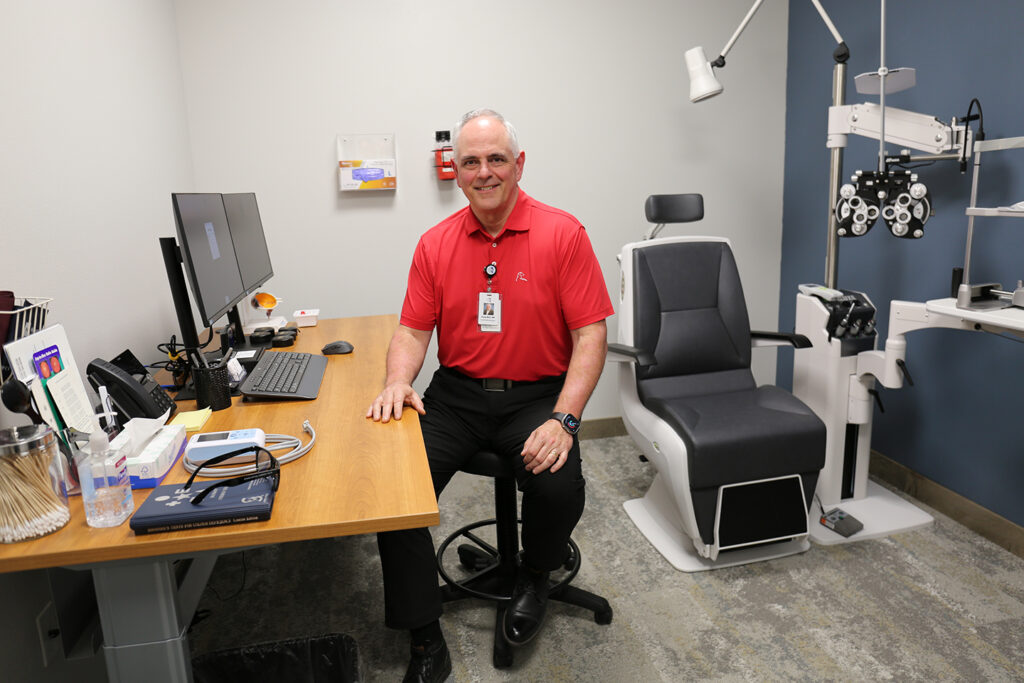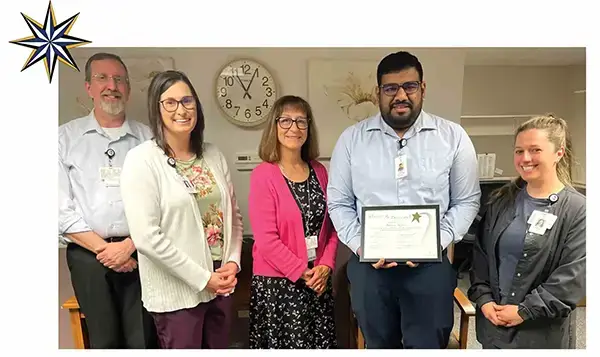
Diabetic Eye Care & Retinopathy Treatment

Living with diabetes means paying close attention to your overall health—including your vision. High blood sugar levels can affect the delicate blood vessels in your eyes, leading to serious complications if not managed properly. At Reedsburg Area Medical Center (RAMC), we’re committed to helping patients with diabetes protect their eyesight through advanced, compassionate eye care.
Our ophthalmologist, Dr. Douglas Bull, provides comprehensive diabetic eye exams for early detection of diabetic retinopathy and macular edema. With convenient access to care right here in Reedsburg, WI, our goal is to help you maintain healthy vision for life.
How Diabetes Affects Your Eyes
Diabetes can impact nearly every part of the body, but your eyes are especially vulnerable. Over time, elevated blood sugar levels can damage the small blood vessels in the retina—the light-sensitive tissue at the back of your eye. This condition is known as diabetic retinopathy, and it’s one of the leading causes of vision loss among adults.
If left untreated, diabetic retinopathy can progress to diabetic macular edema (DME)—a buildup of fluid in the center of the retina that causes blurred or distorted vision. Fortunately, with early detection and proper care, these complications can be managed effectively.
Signs and Symptoms of Diabetic Eye Disease
In the early stages, diabetic retinopathy often has no noticeable symptoms, which is why routine eye exams are so important. As the condition progresses, you may experience:
- Blurred or fluctuating vision
- Dark spots or “floaters” in your field of vision
- Colors appear faded or dull
- Vision loss or blank spots
- Difficulty seeing at night

Why Regular Diabetic Eye Exams Matter
Even if your vision seems fine, diabetes can cause gradual damage that only an eye specialist can detect. Comprehensive diabetic eye exams allow for early diagnosis of changes before symptoms appear.
At RAMC, we work closely with your primary care provider or endocrinologist to ensure a coordinated approach to your eye and overall health. Regular eye exams can prevent serious complications and help preserve your sight.
Recommended Eye Exam Schedule for People with Diabetes
Type 1 Diabetes: Initial exam within 5 years of diagnosis, then annually
Type 2 Diabetes: Eye exam at the time of diagnosis, then annually
Pregnant Women with Diabetes: Exam before conception and during early pregnancy
Advanced Diagnostic Technology at RAMC
Our ophthalmology department uses leading-edge diagnostic tools to detect even the smallest changes in your eye health. These include:
Optical Coherence Tomography (OCT): Provides detailed images of the retina to detect swelling or fluid buildup.
Diabetic Retinopathy and Macular Edema Treatment Options
If diabetic eye disease is detected, there are several proven treatment options available at RAMC:
Injections (Anti-VEGF or Steroid Therapy)
Medications are injected directly into the eye to reduce swelling, slow disease progression, and prevent new abnormal blood vessel growth.
Laser Therapy
Laser photocoagulation is used to seal leaking blood vessels in the retina, helping to stabilize or improve vision.
Surgical Options
For advanced cases, a vitrectomy may be performed to remove blood or scar tissue that’s interfering with vision.
Diabetic Retinopathy and Macular Edema Treatment Options
If diabetic eye disease is detected, there are several proven treatment options available for managing diabetic retinopathy and diabetic macular edema (DME). At Reedsburg Area Medical Center (RAMC), Dr. Bull provides thorough evaluation and diagnosis, ensuring patients receive timely, coordinated care based on the stage and severity of their condition.
Injections (Anti-VEGF or Steroid Therapy)
These medications are commonly used to reduce retinal swelling, slow disease progression, and prevent the growth of abnormal blood vessels in the eye. While Dr. Bull does not perform injection treatments at RAMC, he will refer you to a trusted retinal specialist for these procedures and continue to monitor your progress as part of your ongoing eye care.
Laser Therapy
Laser photocoagulation may be recommended to seal leaking retinal blood vessels and help stabilize or preserve vision. This treatment is also performed by a retinal specialist, and Dr. Bull will coordinate your referral and follow-up care to ensure continuity of treatment.
Surgical Options
In advanced cases where bleeding or scar tissue interferes with vision, a vitrectomy may be recommended. Dr. Bull assists in identifying when surgery is necessary and will refer you to an appropriate specialist for surgical management, while continuing to provide supportive follow-up care at RAMC.
Preventing Vision Loss from Diabetes
The best way to protect your vision is through proactive management of both your diabetes and your eye health. Steps you can take include:
- Keeping blood sugar, blood pressure, and cholesterol levels under control
- Maintaining a balanced diet rich in fruits and vegetables
- Exercising regularly
- Avoiding smoking
- Scheduling annual diabetic eye exams
Why Choose Our Practice
When it comes to managing your vision and diabetes, you deserve care that’s both advanced and personal. At Reedsburg Area Medical Center, our focus is on prevention, early detection, and long-term vision preservation.
Douglas Bull, MD, an Ophthalmologist, provides eye care for residents of Reedsburg and the surrounding communities, helping them achieve clearer vision.
- Dr. Bull is a Board-certified ophthalmologist with years of experience
- Advanced diagnostic technology for accurate results
- Convenient Reedsburg location serving patients throughout the area
- Warm, patient-centered care for the whole family
- In-network with many insurance plans
We treat our patients like family because in a close-knit community like ours, you probably are!
Frequently Asked Questions (FAQs)
What is the difference between diabetic retinopathy and macular edema?
Diabetic retinopathy occurs when diabetes damages the tiny blood vessels in the retina, while diabetic macular edema (DME) is a complication where fluid builds up in the center of the retina, causing blurry or distorted vision. Dr. Bull evaluates for both during a diabetic eye exam to detect and treat these issues early.
Can I have diabetic eye disease even if my vision seems normal?
Yes. In the early stages, diabetic eye disease may not cause any symptoms at all. That’s why annual eye exams are so important—they allow Dr. Bull to identify changes before vision is affected, giving you the best chance to prevent permanent damage.
What can I do at home to support healthy eyes with diabetes?
Maintaining healthy blood sugar levels is the most important step. In addition, eat a nutrient-rich diet, stay active, avoid smoking, and protect your eyes from UV light. These habits, combined with regular exams, help lower your risk of vision complications.
What happens if diabetic retinopathy is left untreated?
If diabetic retinopathy isn’t managed, it can progress to advanced stages where bleeding, scarring, and retinal detachment cause irreversible vision loss. Early detection and timely treatment—such as injections or laser therapy—can significantly slow or prevent this progression.
Meet Douglas Bull, MD
The cornerstone of ophthalmology at Reedsburg Area Medical Center is Dr. Douglas S. Bull, MD. With over 30 years of experience, Dr. Bull delivers expert, compassionate eye care to area residents of Reedsburg and other local communities. He is highly trained in diagnosing and treating a full range of eye conditions—from routine exams and glaucoma management to advanced procedures like laser retina surgery and cataract removal. With his deep expertise and commitment to patient well-being, you can trust your vision is in skilled hands.

Schedule Your Comprehensive Eye Exam Today
Don’t wait for symptoms—protect your vision by scheduling an appointment now. Call 608-768-3900 to schedule your diabetic eye exam with Dr. Bull at Reedsburg Area Medical Center.






